“I owe everything to Tottenham Hotspur”: Pep Guardiola reveals how Tottenham has influence his career and sent a three-word appreciation message to Tottenham and all Spurs fans
“I owe everything to Tottenham Hotspur”: Pep Guardiola reveals how Tottenham has influence his career and sent a three-word appreciation message to Tottenham and all Spurs fans.
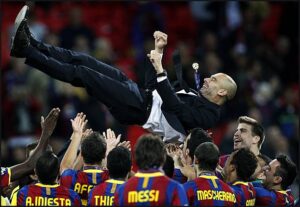
As one of the most decorated managers of all time prepares for his latest tussle with Tottenham this weekend, Takis Anatolitis explores the origins of his football philosophy, connecting the dots all the way back to White Hart Lane over a century ago.
“Take the ball, pass the ball” – that was the mantra of Pep Guardiola’s era-defining Barcelona powerhouse in the 2010s that will surely always remain his magnum opus. Perhaps these words grossly oversimplify the tactics behind such a revolutionary, all-conquering football phenomenon but, as we will go on to explore, it’s not the first time a trailblazing style of football has been reduced to such basic terms. The ‘push and run’ Spurs side of the early 1950s may well have been the blueprint laying the foundations upon which ‘Total Football’ and, in turn, Guardiola’s entire footballing philosophy, was built. This is the story of how Pep Guardiola owes everything he has accomplished to Tottenham Hotspur Football Club.
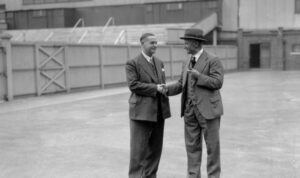
Our story begins in black and white, nearly a century before Lionel Messi, Xavi and company would come to dominate European football, with a Scot named Peter McWilliam. McWilliam, though less celebrated that Bill Nicholson or even Arthur Rowe, was actually Spurs’ longest serving manager. Though he wasn’t as successful or revered as those who followed him, he was arguably the most significant in terms of tactical development.
McWilliam managed Spurs in two spells; though his first brought the most success, including Spurs’ second FA Cup win in 1921, it was in his second in particular that McWilliam really started to implement his revolutionary ideals about how the game should be played – ideals that would be soaked up and internalised by many of his players, including crucially, three very significant future managers. His ideology would form part of the very fabric of Tottenham Hotspur.
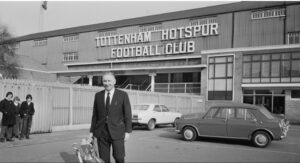
At a time when the fashion in football was very much one of hoofing the ball long and bypassing the midfield entirely, a method best-known as ‘kick and rush’ (and a tradition that many teams proudly continue to this day – you know who you are), McWilliam’s style was based much more on purposeful, intelligent passing and keeping the ball, the building blocks for what would come to be known by some as the ‘Spurs way’ in the years to come. Whenever Spurs fans have complained over recent years that the club may have lost touch with its ‘Tottenham DNA’, whether they realise it or not, it probably all comes back to this time.
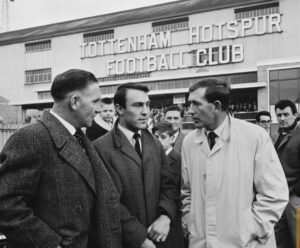
During this spell, McWilliam also entered a formal arrangement with non-league Northfleet United whereby Tottenham youngsters would not only play for them, but play with a tactical approach consistent with Tottenham’s style, so as to prepare them for the step up to the Spurs first team. This was at a time where the concept of a feeder club didn’t exist and was a strategy very much pioneered by McWilliam. It’s also here that parallels start to form with the early days of Guardiola, his time managing Barça’s B team and of course his success promoting future stars from the esteemed La Masia academy up through the ranks.
One such youngster who found his way into the Spurs team having honed his style of play at Northfleet was Bill Nicholson, a man who needs very little introduction to most Spurs fans. McWilliam gave Nicholson his debut beginning a legendary 55-year love affair with the club. Nicholson of course went on to become Tottenham’s most beloved and successful manager of all time, masterminding the famous double-winning side of the 60s in what was surely the ‘Spurs way’ realised to its peak. That team was considered by many at the time to be the best club side ever seen, not just in terms of effectiveness, but also entertainment. To recall the immortal words of Danny Blanchflower, captain and pivotal figure in that side:
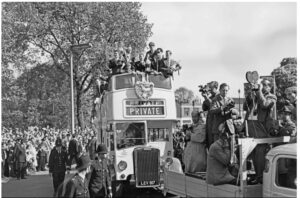
“The game is about glory, it is about doing things in style and with a flourish, about going out and beating the other lot, not waiting for them to die of boredom.”
Nicholson’s Spurs may have epitomised McWilliam’s ideals and executed them to their most devastating effect, but it was Bill’s former teammate-turned-manager, Arthur Rowe, who had picked up the baton a decade earlier, who laid the foundation for those ‘glory glory’ days. Rowe’s Spurs were synonymous with the phrase ‘push and run’, the natural extension of McWilliam’s initial emphasis on smart passing moves to progress the ball up the pitch. Most notably, Rowe achieved the unthinkable when he got Spurs promoted to the top flight in the 1949/50 season, before leading them to the First Division title the very next year. Perhaps the most famous member of that team was one Sir Alf Ramsey who would go on to coach England’s ‘wingless wonders’ to World Cup glory on home soil in 1966.
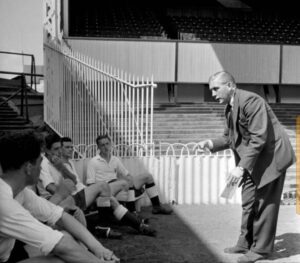
As Jonathan Wilson explains in ‘Inverting the Pyramid’,
“The most successful radicalism came at Tottenham Hotspur, where Hungarian thinking had taken hold even before the watershed of 1953. Arthur Rowe had lectured in Budapest in 1940, but education had proved a two-way process; after giving the sport to the world, finally there was cross-pollination back into Britain. Thanks to Peter McWilliam, an enlightened coach of the twenties and thirties…Tottenham had a historical preference for a close-passing game, something of which Rowe had been part.”
Rowe the player, incidentally, would have probably slotted nicely into a contemporary Guardiola side. Best described perhaps in today’s football parlance as a ball-playing centre-back, Rowe was an intelligent defender, comfortable in holding on to the ball until he saw an opening to play an accurate pass rather than simply launching it up to the forwards. The philosophy instilled in him by McWilliam, combined with his studies of the blossoming Hungarian game, set him on the path to translating his style onto the pitch as a coach with great success. The ‘push and run’ team was characterised by quick passing triangles and players making clever use of space by running forward to get the ball back off a teammate – a stone’s throw from modern Tiki Taka, you might say. ‘Make it simple, make it quick,’ were his instructions. Rowe didn’t invent the one-two any more than Elvis invented rock and roll but he was as influential as any in popularising its prevalence in football.
The third future manager playing under Peter McWilliam to go on and have a profound influence on tactical thinking was maybe the one least familiar to the average Spurs fan, yet arguably the most important to the game as a whole. Just like Nicholson, Vic Buckingham learned how to play the Spurs way at Northfleet United under McWilliam’s meticulous instruction from afar. As a manager, Buckingham was a journeyman who worked his way across the far reaches of the continent, but along the way he most notably took charge at both Ajax and Barcelona, leaving his mark at both. To some he is English football’s forgotten man, but to many he is considered the godfather of ‘Total Football’.
Buckingham was, at times, an outspoken and controversial character with a management style that could make Harry Redknapp blush. “Fuck Betis!” he once proclaimed to his shocked Barcelona players in the dressing room, before kicking a nearby tactics board to the ground. Sure, it’s not quite Louis Van Gaal dropping his trousers at Bayern Munich to show his team that he literally had the balls to drop any of them, but I’m sure they took notice nonetheless. Behind outbursts like this though, was a cultured scholar of the game, a football intellectual who, like Rowe, took his education from Spurs and expanded upon on it, adding his own interpretations and tweaks and applied his style most pertinently at Ajax.
Speaking to David Winner in an interview for his book, Brilliant Orange, in 1993, Buckingham explained: “Possession football is the thing, not kick and rush… Long-ball football is too risky. Most of the time what pays off is educated skills. If you’ve got the ball, keep it. The other side can’t score…” – a quote that could just as believably have come from Guardiola himself.
If Bill Nicholson needed little introduction, then the seventeen-year-old to whom Buckingham gave an Ajax debut in 1964 needs none whatsoever – his name was Johan Cruyff. Such is his importance to the modern game, and to Guardiola in particular, that it’s here where I could quite easily end with ‘and the rest is history’. Buckingham discovered the prodigious Cruyff as a 12-year-old and, at a time where an ageing Ajax team was in desperate need of refreshment, turned to a complement of youth players, with Cruyff chief among them. Buckingham’s influence over Cruyff was instant and profound – the two were so close that Cruyff would go on to name Buckingham godfather to one of his children (no, not Pep, I do mean his actual child). To quote Buckingham’s eventual successor at both Ajax and Barcelona, Rinus Michels, a man probably more closely associated with Total Football by the masses:
“[Cruyff] was only seventeen when he first played at Ajax, yet even then he delivered running commentaries on the use of space to the rest of the team, telling them where to run, where not to run. Players did what the tiny, skinny teenager told them to do because he was right.”
Right from the start, Cruyff was the conduit on the pitch for Buckingham’s philosophy, passed down from generation to generation like a treasured family heirloom, fine-tuned along the way with each iteration. For those with a passion for the history of football tactics, trying to whittle down Cruyff quotes is a bit like being a kid in a candy store, but so many of his views on the beautiful game seemed to echo those most attributed to the Spurs glory days, that it’s hard to overlook.
“Quality without results is pointless. Results without quality is boring,” said Cruyff, famously. “Winning is just one day, a reputation can last a lifetime. Winning is an important thing, but to have your own style, to have people copy you, to admire you, that is the greatest gift.” Just as it was to Blanchflower and Nicholson, to not only win but to win with style seemed of great importance to Cruyff as well.
Guardiola is almost certainly Cruyff’s most decorated and exalted disciple from his days cementing his legacy at Barcelona. One could write an entire book on Cruyff’s influence at the Catalan club, let alone the game as a whole, but to try and summarise as well as I can, he was the man who gave Barcelona the signature style and modern identity most of us associate with that brilliant Guardiola team. He revolutionised the youth system, shifting focus to pave the way for smaller, more technical players to flourish and placed players’ ability on the ball and the use of space top of the agenda.
He was so instrumental in the overhaul of the notorious La Masia that it’s not a stretch to suggest that, without his intervention, we might never have seen quite the same Xavi, the same Iniesta, even the same Messi that mesmerised us for so many years at the Camp Nou. The Dutchman’s influence over Guardiola is well-documented and Pep himself has spoken at length about his importance in his own development as a player and then a manager – “I knew nothing about football before Johan Cruyff,” he said, “…for me he is the most influential manager of all time.”
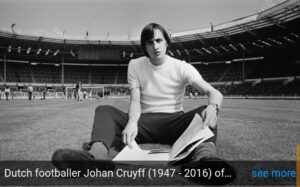
So, as Guardiola seeks to add further silverware at Manchester City, putting more bells and whistles on his own already impressive legacy as a manager, I can’t help but wonder if he ever connects the dots as far back as that first domino all the way back in the 1920s at White Hart Lane. There is a certain irony to the fact that Tottenham seems to be one team to have traditionally caused the Manchester City manager problems – even when the North Londoners have found themselves struggling for form.
Perhaps it’s a slight exaggeration to credit Spurs solely with all of his success – you’ll have to forgive the somewhat tongue-in-cheek headline, call the clickbait police if you must, but one thing is for sure, Guardiola might choose to deny it, but Tottenham DNA runs through his footballing veins, whether he likes it or not.